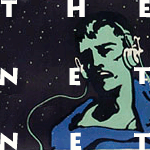What's the story with Stereolab? After a year-long break following the nattily textured, very boogie-able Emperor Tomato Ketchup, the Franco-English drone-pop band returns with another electronic missive, Dots and Loops. But the new CD, while immediately recognizable as a Stereolab transmission, sounds flat, a bit airbrushed, like it's been run over by a sonic steamroller.
If you haven't encountered Stereolab's sound, consider this: Give a handful of skilled, punk-leaning musicians an intensive training course in the schlocky world of 1950's and '60s electronic music, all filled with Moog synthesizers, theremin, and audiophilic-obsessive production values (think of Perrey-Kingsley's early electronic pop manifesto, The In Sound From Way Out, or anything by Juan Garcia Esquivel). Mix with a dash of miscellaneous Marxist revolutionary theory, some standard-issue consumer-culture discontent, and a relentlessly whimsical, sometimes cornball approach to sound selection. The result: mostly short, pop-format songs anchored by a constant synthesizer drone, bubblegum soundbursts, and the sweet-as-silk Francophone mumblings of vocalists Laetetia Sadier. It's user-friendly music, easy to get along with, but the group always plays with additive, constantly changing textures, so there's nutrition in the candy, too.
Or at least so it went on Emperor Tomato Ketchup. Dots and Loops follows the same patterns but never quite jumps headfirst into the complexity of the earlier album. It's a more timid sound -- less groove-oriented, with fewer hooks. There are some new sounds on this disc, though; "Parsec" delves into the very fashionable world of drum 'n' bass for some liquidy, deep bass sounds and excellent drum programming. Dedicated Tortoise fans will recognize some percussion and production assistance from the ever-present John McEntire, the spiritual godfather of Chicago's "post-rock" scene. And the core members of Mouse on Mars, Jan St. Werner and Andi Toma, provide their inimitably fun brand of adventurous noisemaking on "Ticker-tape of the Unconscious" (it's billed on the liners as "special electronics and insect horns").
Stereolab's early days -- from the 1994 CD Mars Audiac Quintet to the early EP releases (reprinted on Refried Ectoplasm) were noisier, more primitive, more heavily invested in a translation of radical politics to the recorded surface. But with Transient Random Noise Bursts With Announcements and Emperor, the band drifted away from the bombastic Marxist treatment toward a softer, more musical sound. On Dots and Loops, they've overshot the curve: the lessening commitment to leftish politics has left them somewhat aimless, disunified, too much inclined to rest on the formal constraints of pop where they previously critiqued those forms from within. It's a conundrum -- overt reliance on heavy theory weighs you down, closes off possibilities of playfulness, but the retreat from politics can leave you stranded in uncritical waters.
That said, the 18-minute track "Refractions in the Plastic Pulse" offers a fresh new take on this pop/experimental/dance music business. It's almost a symphony, with several distinct movements -- there's even a pregnant pause between each, as if an android conductor were pausing to steady his baton. Discrete motifs appear, submerge, and reappear in later sections -- particularly interesting is the electrified water-pipe clanking that carries the rhythm through the middle sections. The adoption of classical music organization is refreshing; it's a welcome shift from the overused A-B-B-C-A format of electronica (intro, middle dance/melody section, breakdown, return to intro).
"Refractions" doesn't break hugely revolutionary ground, but it's a helpful pointer, a useful inspiration -- which is the way Stereolab's influence, wide as it is, percolates through the musical world. Stereolab sits in that awkwardly accessible space between avant-garde experimentalism and shameless mass-audience appeal, offering both simple diversion and thought-provoking recombinations of sound. Although it will undoubtedly get a close listen from most artists in the electronic underground, Dots and Loops sits firmly in the mainstream.
Pick of the Month
Not a sonic text this time, but a written one: Theodor W. Adorno's essay "Perennial Fashion -- Jazz" in Prisms (MIT Press, 1967). OK, he has no clue what's really up with jazz (he denies the vitality and originality of jazz's improvisational structure), but as a critique of mass-audience "consumer" art, it's an unbeatable classic, pointing to the way pop art, even "radical" or "subversive" art, legitimates the dominant culture. Read it and pretend he's not talking about jazz (fill in the blank with whatever word you prefer; I like to substitute "techno" for "jazz"). Best sentence: "[In jazz] fashion enthrones itself as something lasting and thus sacrifices the dignity of fashion, its transience."
See also AjD's April 1996 review of Stereolab's
Refried Ectoplasm (Switched On Volume 2)
on the The Net Net.



